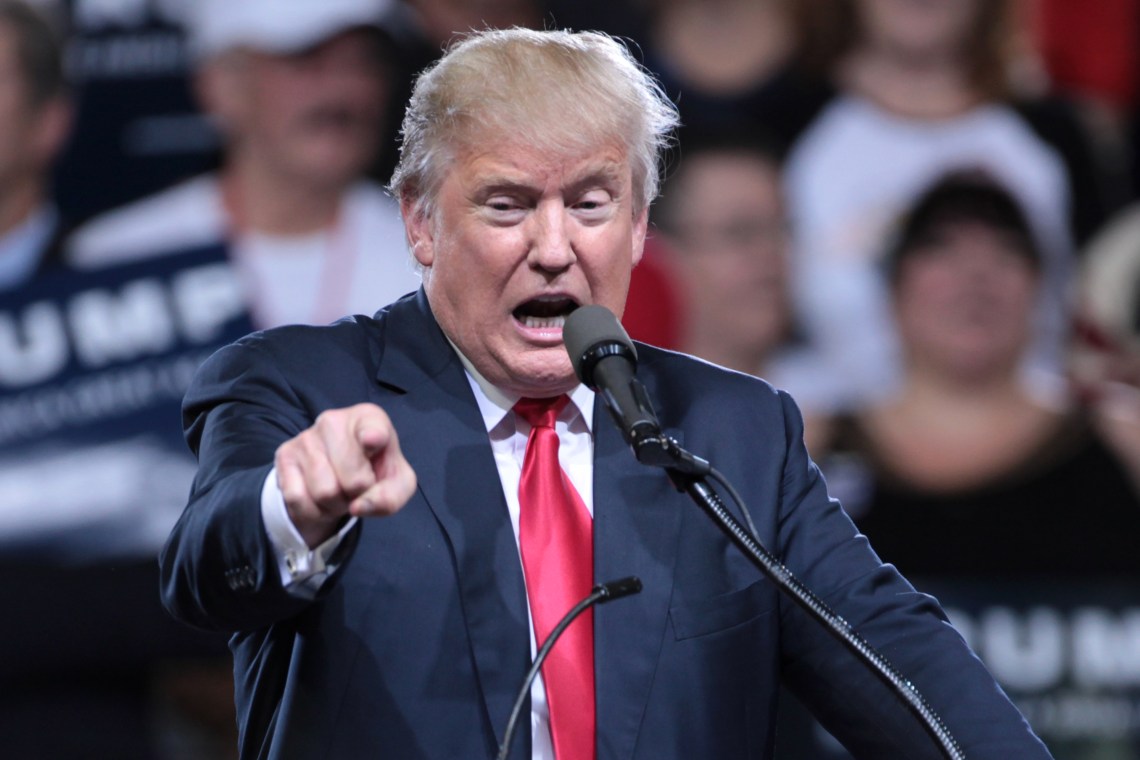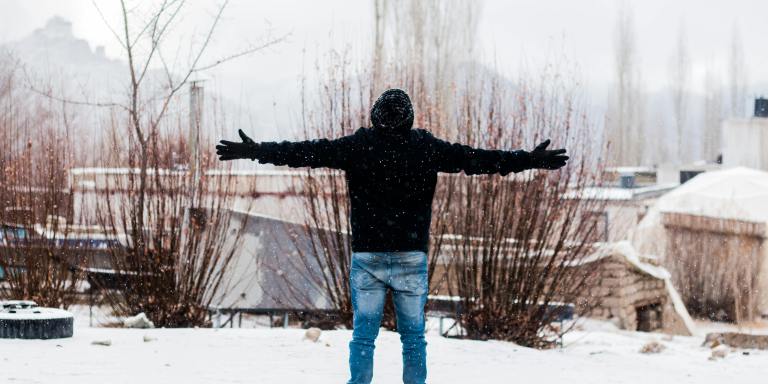
I originally submitted this piece to the New York Observer where I am an editor-at-large and a columnist on media and culture. Editorial decided it would no longer accept columns of this nature on this topic. I have the utmost respect for the leadership at the Observer, but I respectfully disagree with that decision.
Dad, let me start this letter by saying that it isn’t my intention to embarrass you. I find that I can express myself in writing better than I can when we talk on the phone (in fact, if anyone likes this piece, that will be, in its own way, a compliment to you — I developed as a writer sitting alone in my room as a kid, trying to find ways to respond to your overwhelming parental logic) and so when I heard that you were leaning towards voting for Donald Trump, I felt inclined to put my thoughts down so they would be clear.
It’s fitting that I would write to you here anyway, because the Observer has its own father issues when it comes to Donald Trump (Mr. Trump is the publisher’s father-in-law.) This is a newspaper that, despite its sincere and passionate reporting on anti-Semitism and its frontline investigations on the rise of Russia as a national security threat, has found itself endorsing and defending Trump…even as he veers dangerously towards courting anti-Semitism and justifying Russia’s authoritarian methods (when he isn’t complimenting the tactics of Saddam Hussein.) Having been associated with my own fair share of controversial people, I empathize with the position, Jared Kushner, the paper’s owner, must be in.
I get that elections are complicated. Yet I cannot help but feel that the right choice has become increasingly simple. Not easy, but simple.
The choice is simple because it’s hard for me to think of a single person who violates more of what you taught me as a child. The case against Donald Trump as a candidate — even as a person worthy of two seconds of anyone’s serious attention in our busy lives — is clear to me precisely because of what I learned from you, Dad.
I remember the trips we took to Angel Island in the San Francisco Bay. This is where people like Grandma and Grandpa first arrived in America, you told us. It was here that they stopped on their way to the American Dream, fleeing the terror of their homeland and hoping for a better life. You taught us that it was honorable and brave to be an immigrant and that what made America special was that we opened our arms to these people. Do you remember taking us to the Civil War battlefields and explaining how many of the men who fought and died in that war were fresh off the boat, paying for their citizenship to this country in blood — dying to eradicate the scourge of slavery, a plague they had nothing to do with creating in the first place? That was what made America great, you said.
But you didn’t just teach us to admire white European immigrants either. It was from you that I learned to respect just how hard Latino, Asian, and Middle Eastern immigrants worked to make a life for themselves here. You told me what it was like picking fruit in the California heat, and explained how they took jobs that other people weren’t willing to do — because they wanted to support their families just like everyone else. You also took the time to explain how many immigrants were entrepreneurs — starting restaurants and small businesses from donut shops to car dealerships (we’ve invested together in a few of those small businesses) and how their efforts made the world better for everyone.
When I was in Austria a few years ago, I called Mom and had her do some research to find the location of the refugee camp that Grandpa was sent to when he was just a little younger than I am now. It’s an apartment complex now, which I guess goes to show how quickly we can forget the kind of thinking that creates such horrors. Experiences like these — they color the way I see the world, which is why, I imagine, you encouraged us to travel and study history. Those trips are why I find it so repulsive to hear Donald Trump talk about how Mexicans are “rapists” and how his solution is building a literal wall — “We’re going to have a big, beautiful wall that nobody’s crossing” — to keep these kinds of people out. I find it disgusting to hear him talk about banning Muslims from America. That’s not what you taught me. That’s not how this country is supposed to work. Mom and half our relatives wouldn’t be here if it was.
I told you that a few weeks ago we had someone out at the house to repair some damage from the floods. As I was walking the property with the guy, he asked me if I owned a gun. I said that I did — this is Texas after all. “Good,” he said, “you’ll need to have something when them sand niggers come and try to take this country from us.” Then he told me about how he was glad Donald Trump was speaking the truth and taking things in the right direction.
I know you don’t agree with this man. And I don’t think it’s fair to hold a candidate accountable for every fringe group that attaches themselves to their platform. But doesn’t it alarm you to see a candidate who seems to stoke these kinds of fires — directly or indirectly? Surely you must be shaking your head at Trump’s repeated refusal to distance himself from these people.
As a police officer, you worked for a time in the hate crimes division. You’ve seen the horrible things that prejudice and ignorance can do. I remember you once told me that the way the Ku Klux Klan recruited people in our hometown was by convincing white people that they were being attacked and that their way of life was under siege. C’mon Dad, is that not eerily similar to some of Trump’s campaign tactics? Why else would he have refused to immediately disavow the support of David Duke and other white supremacists? What possible purpose did he have to insinuate that President Obama was a Muslim, that he was not born in America? Or question a Mexican-American judge’s loyalty to the law and to the Constitution?
A few years ago, Donald Trump went on live television and talked about how nice his daughter Ivanka’s body was, saying how if he wasn’t her father, he’d probably be dating her. It was disturbing then, but we all say things that come off utterly differently than intended. Except last year, speaking to a Rolling Stone reporter, Trump said the exact same thing again. “Yeah, she’s really something, and what a beauty, that one,” he told the journalist. “If I weren’t happily married and, ya know, her father…”
You have a daughter (and now a daughter-in-law). Can you imagine saying anything like that about them? What would you say to one of your friends who uttered something half that creepy? You’ve been married for thirty years. You taught me about respecting women, about the importance of marriage and fidelity. This man, he doesn’t stand for any of that. On the contrary, he refers to women he doesn’t like as “fat pigs” and “dogs.” He attacks them and when they press him on the issues, says it’s because they’re probably menstruating.
You’ve protected presidents and other heads of state as part of your job. Can you imagine any of them behaving that way? I remember our family trip to the White House in middle school — even though you disagreed with the man who was President, you spoke of the office with such reverence and dignity that we felt honored just to visit. I left that day with exactly the sense of admiration and respect for the office that I think you hoped we’d feel. I remember another trip to New York where we walked by the Trump Tower. What’s that, I asked? You just shook your head and said, “Tacky.”
Before he died, Grandad gave me his copy of John McCain’s memoir Faith of My Fathers and said that I might like to read it. It wasn’t until years later that I got around to it. Did you know that when John McCain was trapped in that horrible North Vietnamese prison, his captors offered to let him go several times? McCain’s father was the commander of all US forces in the Vietnam theater and the Vietcong thought by giving his son an easy way out, they could show that Americans were cowards. Despite the repeated torture that he’d already undergone, despite the fact that McCain ached to go home, he refused. He stayed because he refused to embarrass his country or abandon his comrades — death was better than dishonor. I think that’s the kind of lesson that Grandad was trying to pass along to me. I know you voted for McCain in 2000 and in 2008 in part for that very reason. I don’t agree with many of McCain’s politics but I hope that when tested, I could exhibit one iota of the courage that that man has.
And yet here we are discussing a Republican candidate who insulted John McCain in front of the entire world — claiming that John McCain isn’t a hero because he was captured and spent time in a POW camp. Donald Trump, who got out of serving with a series of draft deferments, said he only likes the veterans “that weren’t captured.” That this pathetic encounter has been nearly forgotten in the campaign is not because Donald addressed it or apologized, but rather because nearly every day since he either said something worse or piled on with some other obscene gesture or gaffe.
Wouldn’t just a single one of these remarks have run a candidate out of the race in a normal election cycle? Wouldn’t have these repeated and ridiculous lapses in judgement effectively end the campaign for anyone in any election anywhere in the civilized world? I’ve tried to think about why we’ve been so forgiving of Donald Trump. Is it because his opponent is a woman? Does it say something about us? Have we all collectively lost our sense of where the line is and we’re just hoping that someone will finally draw it for us?
I realize that most of these issues I’ve brought up are personal ones, but isn’t all politics personal? That’s a lesson I learned from you, too. I remember asking whether you supported the Republican or the Democrat candidate in some local election when I was a kid, having heard some friends’ parents talking about it. You told me that people got too caught up in party affiliation and that what really mattered was character and whether you could work together with the person (and whether they could do the job). That’s how I’ve tried to think all my life. I’m thinking about it now that it really matters.
The baffling reality is that when it comes to Trump, it’s difficult to critique him on much besides his personality and (lack of) character — because that is all there is. Maybe you can make an exception for some of these comments, I’ve certainly said dumb things before. We all have. Maybe we chalk them up to media mischaracterizations as some of the Trump supporters I know have (given what I write about in this column, I’m the last one to think the media is completely fair or trustworthy). But even making allowances for that, I know for a fact, no matter what the talking heads on TV are trying to tell moderate conservatives, is that you and he stand very far apart on most of the economic principles and civil policies in which you have always believed.
I remember long trips in the car and the conversation we had about civics and governance. The basics you taught me about the free market, about capitalism, about the government staying out of people’s business. Now that I’m an adult, I’ve come to fully understand and truly appreciate why you taught me these lessons. I see how they’ve contributed to my own success. I also see how the few policies or firm beliefs Trump might actually have fly in the face of all of them.
Besides repeatedly donating money to Democratic (and Republican) candidates from whom he tried to get favors, Donald Trump has said publicly that there should be “some form of punishment” for women who get abortions (though he later backtracked under pressure). He’s advocated economic policies that the experts say will start trade wars with China and Mexico. He cheered Brexit because it might drive traffic to his Scottish golf courses (the definition of a conflict of interest), has hinted at using federal resources to go after personal enemies like Jeff Bezos, admits he would continue to let his children run his numerous international businesses while in office, supports “opening up” our libel laws to reduce freedom of the press, and apparently believes that global warming is a lie created by China.
I suppose it would be one thing if these beliefs came from some unique ideological framework but we both know they don’t. He’s a man who reacts, a man who speaks before he thinks (something you always taught me to avoid). These aren’t the meticulously crafted positions of an educated leader surrounded by qualified and informed policy experts — as Trump famously said, he advises himself. There is a quote I read from Winston Churchill recently. During World War One, someone asked why he was reading the work of a certain anti-war poet. “I am not a bit afraid of Siegfried Sassoon,” Churchill said, “That man can think. I am only afraid of people who cannot think.”
I think that’s why I am so scared, Dad. That’s why I am writing you this letter. I don’t think this man has done a lick of thinking in years — except about himself and the irrational prejudices and fears which rule his increasingly erratic and bizarre life.
If my understanding of where you sit it is correct, you are inclined to agree with most of the criticisms I’ve just made and yet are swayed by very few of them. As is true for a lot of Americans, I know you’ve been disturbed with a lot what Trump has said and wish sincerely that someone else was running in his place. The problem is — the reason you can’t help but feel pressure to give him the benefit of the doubt or vote for him reluctantly — is that you feel a profound and real distrust towards Hillary Clinton.
I wasn’t old enough to experience the anger and disillusionment that the Clintons brought to the White House. I get the sense that you see them as thoughtless, careless self-aggrandizers who believe themselves to be above the law. Given the evidence, this is a more than fair assessment. You have real, negative experiences with the last administration and the vague memories of the scandals and noise of that era probably makes another four years seem unappealing. I get it.
It was J.K. Galbraith who said that politics was a matter of choosing between the disastrous and the unpalatable. I don’t disagree with you we are dealing with less than ideal options. But surely, unpalatable is better than disastrous.
Then again, no one is saying you have to vote for Hillary. I’m just asking if you could not vote for Donald Trump. Vote for a third party candidate. For a write-in, you could take a page from Trump’s people, who when they initially had trouble finding people to speak on his behalf at the convention, apparently just put “George Washington” in as a placeholder. Or, what about just not voting in this election? Is that not a powerful statement in its own right? One does not need to endorse disaster just because they resent unpalatable.
Mitt Romney has said that he was finally motivated to get involved in this election when his son asked him, “When the grandkids ask ‘What did you do to stop Donald Trump?’ what are you going to say?’”
I was so happy to be able to tell you a few weeks ago that you have your first grandchild on the way and that he’s expected to arrive just three days before the election. I think that’s why I am writing this letter too, as my way of asking myself what am I going to do to make sure the world he enters is just a little bit better than the one I came into thirty years ago. I guess I am writing this letter to ask that you, as his grandfather, do what you can to ensure the same.
So that when he does ask, not that many years in the future, looking back at what was hopefully just a painful aberration in this nation’s history, we both have a good answer to how we faced this challenge in front of us. And that we acted — despite any personal feelings, or complications or doubts — with principle and courage.
Dad, please don’t vote for Donald Trump. Everything you’ve taught me about what is wrong in the world is everything that man represents. And if you won’t do it for me, do it for your grandchild. Give him something to be proud of — and thankful for.
Your Loving Son,
Ryan ![]()






